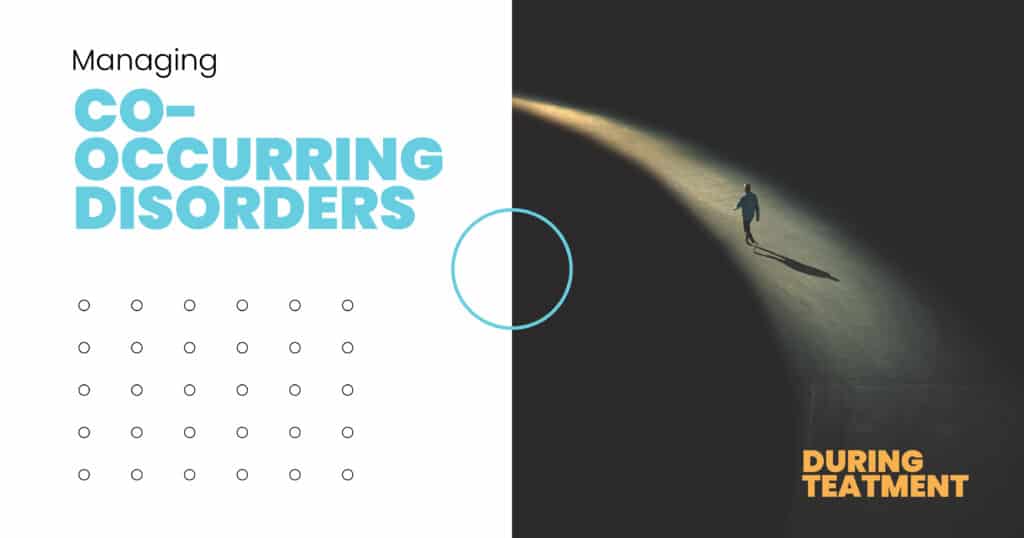Co-occurring disorders, also known as dual diagnosis, involve the simultaneous presence of a mental health disorder and a substance use disorder (SUD). Managing these conditions concurrently presents unique challenges and requires an integrated approach. The complexity of co-occurring mental disorders means addressing both the mental illness and substance abuse treatment to improve overall quality of life.
This guide explores effective strategies for treating co-occurring disorders, ensuring a holistic path to recovery.
Understanding Co-occurring Disorders
Co-occurring disorders can include a variety of mental illnesses paired with substance use disorders. Common co-occurring conditions include:
- Anxiety disorders
- Depression
- Bipolar disorder
- Schizophrenia
- Post-traumatic stress disorder (PTSD)
- Attention-deficit hyperactivity disorder (ADHD)
Why Do Co-occurring Disorders Occur?
Research indicates several reasons for the simultaneous occurrence of these disorders:
- Common Risk Factors: Genetic predispositions and environmental stressors can contribute to both mental health disorders and SUDs. The National Institute on Drug Abuse and the American Psychiatric Association highlight these factors as key in understanding the complex conditions.
- Mental Disorders Leading to Substance Use: Individuals may use substances to self-medicate, which can worsen both conditions over time. Panic disorder and other psychiatric symptoms often lead individuals to misuse substances, exacerbating their situation.
- Substance Use Leading to Mental Disorders: Substance abuse can cause changes in brain structure and function, leading to mental health issues. Drug use disorders and disorders in substance abuse can precipitate psychotic disorders and other mental illnesses.
Effective Strategies for Managing Co-occurring Disorders
Integrated Treatment Approach
An integrated treatment approach, where both disorders are treated simultaneously, is crucial for effective management. This method ensures that treatment plans address all aspects of a person’s health, reducing the risk of relapse and improving overall outcomes. Programs such as those offered by American Addiction Centers and Oxford Treatment Center exemplify integrated services in managing co-occurring mental health conditions.
Comprehensive Assessment and Diagnosis
Accurate diagnosis is vital. Healthcare providers should use comprehensive assessment tools to differentiate between symptoms of SUDs and mental health disorders. Commonly used tools include:
- Alcohol Use Disorders Identification Test (AUDIT)
- Screening to Brief Intervention (S2BI)
- Patient Health Questionnaire (PHQ-9)
- Generalized Anxiety Disorder (GAD-7)
- Mental Health Screening Form III
These tools are crucial for assessment procedures and ensuring an accurate diagnosis of both substance use issues and psychiatric disorders.
Behavioral Therapies
Behavioral therapies are fundamental in treating co-occurring disorders. Effective therapies include:
- Cognitive Behavioral Therapy (CBT): Helps individuals challenge irrational thoughts and behaviors, addressing common co-occurring mental health symptoms.
- Dialectical Behavior Therapy (DBT): Incorporates mindfulness and acceptance techniques to manage emotions and reduce self-destructive behaviors.
- Assertive Community Treatment (ACT): Provides community-based mental health care with an individualized approach.
- Contingency Management (CM): Uses rewards to encourage positive behaviors.
These therapeutic approaches are essential for managing co-occurring substance use and mental health disorders effectively.
Pharmacological Interventions
Medication management can be an essential component of treatment, especially when combined with behavioral therapies. Pharmacological interventions should be carefully managed to avoid interactions between prescription medications for mental health and substances used in SUD treatment. Common medications include:
- Antidepressants
- Mood stabilizers
- Antipsychotics
Tailoring the medication regimen to the individual’s needs and monitoring for adverse interactions is crucial for effective treatment of substance use and mental health symptoms.
Supportive Psychological Interventions
Supportive interventions, such as motivational enhancement and relaxation techniques, can help manage symptoms and improve treatment adherence. Techniques like grounding exercises and simple CBT-based strategies are beneficial in stabilizing mental health during substance use treatment. Motivational Interviewing and self-harm behaviors are also addressed in these interventions.
E-health Interventions and Alternative Therapies
E-health interventions, physical activity, and complementary therapies can enhance the treatment plan. E-health tools provide accessible support and resources, while physical activities and alternative therapies, such as yoga and meditation, promote overall well-being. The National Institute of Mental Health supports integrating these approaches into treatment.
Personalized Treatment Plans
Tailoring treatment plans to the individual’s preferences and readiness is critical. Treatment goals should accommodate a range of objectives, from abstinence to harm reduction, ensuring that the approach aligns with the patient’s desires and circumstances. Personalized plans are essential for effective dual recovery and long-term success.
Building a Strong Therapeutic Alliance
A strong therapeutic relationship between the patient and the healthcare provider is essential. Trust and collaboration can significantly impact treatment adherence and outcomes. Providers should respect the patient’s readiness to address their mental health conditions and adjust the treatment pace accordingly.
Monitoring and Adjusting Treatment
Continuous monitoring and adjustment of the treatment plan are necessary to address evolving needs and challenges. Regular follow-ups and assessments help ensure the treatment remains effective and responsive to the patient’s progress and emerging issues.
Challenges and Considerations
Differentiating Symptoms
One of the primary challenges in managing co-occurring disorders is differentiating between symptoms of SUDs and mental health disorders. Symptoms such as mood changes, sleep disturbances, and anxiety can overlap, making diagnosis complex. Providers should use comprehensive assessment tools to navigate this challenge effectively.
Family and Community Support
Involving family and community support systems can enhance treatment outcomes. Support networks provide emotional backing and practical assistance, helping individuals stay committed to their treatment plans.
Addressing Stigma
The stigma surrounding mental health and substance use can hinder treatment. Educating patients, families, and communities about co-occurring disorders and promoting a supportive environment can reduce stigma and encourage individuals to seek help.
Conclusion
Managing co-occurring disorders during treatment requires a comprehensive, integrated approach that simultaneously addresses mental health and substance use disorders. By employing effective strategies, such as integrated treatment programs, comprehensive assessment, behavioral therapies, pharmacological interventions, and personalized treatment plans, healthcare providers can improve outcomes and support long-term recovery.
Continuous monitoring, family and community involvement, and efforts to reduce stigma are crucial to successful management. American Addiction Centers, Journal of Substance Abuse Treatment, and National Institute on Drug Abuse offer valuable resources and research on managing these complex conditions.









